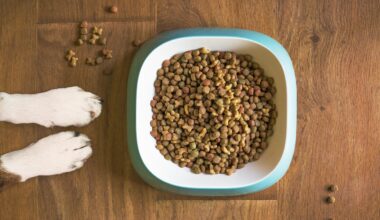The Impact of Poor Nutrition on Dog Immune Disorders
The nutritional health of your dog is vital for their overall well-being, particularly concerning their immune system. Poor nutrition can lead to immune disorders, affecting a dog’s ability to combat infections and diseases. Essential nutrients support various physiological functions, including immune responses. Essential fatty acids, proteins, vitamins, and minerals play a crucial role in maintaining a healthy immune system in dogs. Commercial dog foods often claim to be nutritionally complete; however, many lack specific nutrients vital in maintaining health. Additionally, factors like breed, age, and underlying health conditions can influence a dog’s dietary needs. Meals lacking these important nutrients can lead to deficiencies, compromising a dog’s immunity. Regular veterinary check-ups can help identify potential nutritional deficiencies early. Furthermore, the choice of diet can significantly influence inflammation levels in a dog’s body. Inflammation is a natural response to infection, but chronic inflammation due to poor nutrition can evoke various health problems. Prioritizing a balanced diet that includes high-quality ingredients tailored to specific needs is essential for a dog’s immune health. This commitment can protect against future illnesses and health issues.
To enhance your dog’s nutritional intake, it is important to consider including superfoods in their diet. These foods are nutrient-dense and can significantly boost immune function. Potential candidates for superfoods include blueberries, sweet potatoes, and spinach. These ingredients contain antioxidants, vitamins, and minerals that provide health benefits to dogs. Antioxidants help fight oxidative stress, giving the immune system a much-needed boost. They combat the effects of free radicals and reduce inflammation, paving the way to a healthier immune response. Including proteins sourced from high-quality animal products is equally significant. Overly processed foods can diminish nutritional value. Instead, focus on fresh ingredients whenever possible. Consult with your veterinarian to ensure dietary choices align with your dog’s specific health requirements. Transitioning to fresh recipes may involve gradual changes to prevent gastrointestinal upsets. These small adjustments can lead to significant health improvements over time. Furthermore, hydration is crucial in ensuring overall health, aiding digestion, metabolism, and nutrient transport in the body. Including water in your dog’s daily routine also supports their immune system, as it is vital for all metabolic processes.
Common Nutritional Deficiencies and Their Effects
Identifying common nutritional deficiencies in dog diets is essential for maintaining optimal health. A prevalent deficiency is a lack of essential fatty acids, which can lead to dry skin, poor coat condition, and increased allergies. Omega-3 and Omega-6 fatty acids are crucial for maintaining healthy skin and combating inflammation. Deficiencies in vitamins A, C, D, and E also hinder immune function. These vitamins support myriad bodily functions, including cell growth and repair, metabolic functions, and immune responses. Additionally, low-quality protein sources can contribute to insufficient amino acid intake. Amino acids are vital for immune system health, as they support antibody production and recovery from infections. Calcium and phosphorus deficiencies affect bone health, but they can also impact immune responses. They play significant roles in cellular signaling that influences immune function. Another common deficiency, especially in older dogs, is low fiber intake, which can result in gastrointestinal issues. A healthy gut contributes to overall immune function, emphasizing a balanced approach to nutrition. Regularly assessing your dog’s diet helps in avoiding these deficiencies and promotes better immune defense and overall health.
Another critical factor that contributes to immune disorders in dogs is the impact of obesity. Overweight dogs often suffer from a compromised immune response due to excess fat accumulation. This fat releases inflammatory cytokines, further exacerbating any existing health conditions. As a result, overweight dogs are more prone to infections and chronic diseases. Obesity can be effectively managed by providing balanced meals and encouraging regular physical activity. A proper workout routine coupled with a controlled diet will help maintain a healthy weight. Additionally, obesity can lead to diabetes, which further complicates immune function and overall health. Furthermore, feeding your dog table scraps or high-calorie treats can encourage weight gain. Instead, opt for healthier alternatives such as vegetables or low-calorie treats recommended by veterinarians. Feeding portion-controlled meals also assists in maintaining weight. Adjusting the quantity and quality of food will contribute to the overall nutritional balance. It’s crucial to monitor your dog’s body condition, making necessary dietary adjustments as needed. A consistent exercise routine combined with a proper diet creates a robust immune system, preventing dog immune disorders caused by obesity.
Impact of Poor Nutrition on Aging Dogs
The nutritional impact on aging dogs is significant, particularly as their immune systems begin to weaken over time. Older dogs have unique dietary requirements that must be addressed to prevent immune disorders. Common problems include decreased metabolism and changes in dietary needs. Senior dogs require diets rich in essential nutrients, such as high-protein sources to help maintain muscle mass and functionality. Also, a blend of antioxidants is crucial for aging dogs to combat oxidative stress. Furthermore, obesity is a common concern among senior dogs, contributing to increased inflammation and a weakened immune response. Providing necessary nutrients becomes a balancing act between their unique health status and caloric requirements. Additionally, hydration remains essential for older dogs, as they are more prone to kidney issues and dehydration, which impacts overall health. Ensuring that they consume adequate water daily can prevent related complications. Regular consultation with a veterinarian ensures dietary adjustments support their health as they age. Designing a nutrition plan tailored to senior dogs will enhance their quality of life and support a more effective immune system, reducing risks of illness and infection.
As you consider your dog’s nutrition, it’s essential to be aware of how commercial dog food ingredients may not meet optimal immune health standards. Many mass-produced dog foods contain fillers and preservatives that can negatively impact health. These low-quality ingredients often lack essential nutrients, contributing to deficiencies over time. Making informed choices about pet food can lead to healthier options that prioritize whole, natural ingredients over fillers. It’s beneficial to read the ingredient list thoroughly and choose premium brands that emphasize high-quality proteins and nutrients. Moreover, incorporating fresh, whole foods into your dog’s diet can also enhance their overall nutritional balance. Some pet owners may consider home-cooked meals, but any changes should aim to be nutritionally balanced. Using a combination of high-quality commercial food with fresh ingredients can provide your dog with a well-rounded diet. Seeking advice from a veterinarian can also guide you to the best combinations for your dog’s unique health needs. Proper nutrition should be paramount, promoting a strong immune system ready to fend off various health challenges, hence allowing your furry friend to thrive.
Conclusion: Importance of Monitoring Dog Nutrition
Monitoring your dog’s nutrition is vital for ensuring a robust immune system and preventing associated disorders. Regular assessments of their dietary habits and health can protect against potential issues. Observing changes in your dog’s behavior or health can provide insights into their nutritional status. For example, sluggishness or recurrent infections may indicate an underlying issue linked to poor nutrition. As pet owners, it is essential to stay informed about best practices for feeding, including recognizing the signs of nutritional deficiencies. Additionally, staying vigilant about food safety can help avoid gastrointestinal problems that disrupt nutrient absorption. Consult with veterinarians to formulate the best nutritional plan for your specific dog, tailoring diets based on factors such as age, breed, and health status. Being proactive about nutrition can improve your dog’s quality of life, longevity, and well-being. Effective nutrition is foundational to their immunity, helping maintain resilience against illnesses and health concerns. Investing time in understanding your dog’s unique nutritional requirements can create lasting benefits, allowing them to live long, healthy lives filled with joy and vitality.
Long-term commitment to a balanced and nutritious diet requires attention to detail. Analyzing your dog’s responses to nutritional changes signifies progress. Stay observant when introducing new brands or recipes to avoid gastrointestinal upset. Gradual transitions are key to a successful dietary plan, especially in adult dogs. Moreover, providing variety within safe limits can enhance your dog’s willingness to eat and enjoy their meals. Some pet owners opt for supplements as a way to support dietary gaps. However, these should only complement a well-structured diet, not serve as a substitute. Finally, regular veterinary check-ups are essential, as they can help evaluate your dog’s health comprehensively. Remember, the journey to nutritious eating doesn’t just benefit one area of your dog’s health; it encompasses the entirety of their existence. By striving for optimal nutrition, you’re investing in your furry friend’s long-term(sis as a source of love and companionship, enhancing their capacity to fight illnesses. Recapping essential elements of dog nutrition and immunity is crucial for pet owners. Prioritize quality, balance, and specialized needs to pave the way for a healthier, happier dog.


